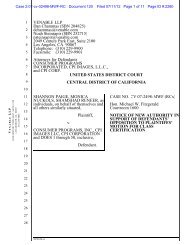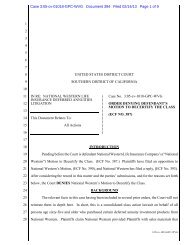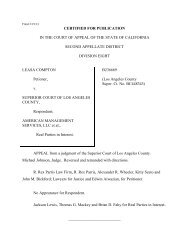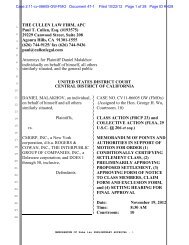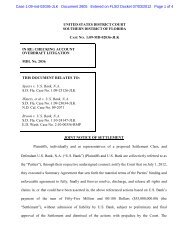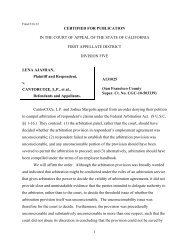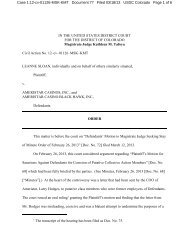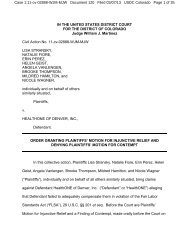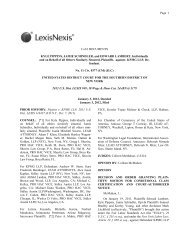here - FindLaw
here - FindLaw
here - FindLaw
You also want an ePaper? Increase the reach of your titles
YUMPU automatically turns print PDFs into web optimized ePapers that Google loves.
allows [the employer] to unilaterally amend the terms of the handbook, and in so doing,<br />
allows [the employer] to unilaterally amend the types of claims subject to arbitration. . . .<br />
[The employer] retains the ability to pick and choose the claims its wants to arbitrate.<br />
―A contract must be based upon a valid consideration or mutuality of<br />
obligation. . . . Consideration may consist of either benefits or detriments to the<br />
contracting parties. . . . It may consist of some right, interest, profit, or benefit that<br />
accrues to one party, or, alternatively, of some forbearance, loss or responsibility that is<br />
undertaken or incurred by the other party. . . . When illusory promises are all that support<br />
a purported bilateral contract, t<strong>here</strong> is no mutuality of obligation and, thus, t<strong>here</strong> is no<br />
contract. . . . A promise is illusory when it fails to bind the promisor, who retains the<br />
option of discontinuing performance. . . .<br />
―Because [the employer] has reserved the right to unilaterally amend the types of<br />
claims covered by [the arbitration] agreement, we conclude that the . . . agreement is<br />
supported only by an illusory promise, and is unenforceable.‖ (C & H News, supra,<br />
133 S.W.3d at p. 647, citations omitted, italics added.)<br />
Two years later, in a dispute between several pharmacies and their ―benefits<br />
management‖ company, the Texas Supreme Court examined an arbitration clause<br />
contained in the parties‘ ―Provider Agreement,‖ which covered several subjects,<br />
including arbitration and the parties‘ reimbursement arrangements. (In re AdvancePCS<br />
Health L.P. (Tex. 2005) 172 S.W.3d 603, 605–607 (AdvancePCS).) The court rejected<br />
the pharmacies‘ contention that the arbitration clause was illusory, explaining: ―[T]he<br />
pharmacies assert [that] provisions in the Provider Agreement allow [the management<br />
company] to cancel the arbitration agreement at will, . . . rendering its promise illusory<br />
and the agreement without consideration. . . . In the context of stand-alone arbitration<br />
agreements, binding promises are required on both sides as they are the only<br />
consideration rendered to create a contract. . . . But when an arbitration clause is part of<br />
an underlying contract, the rest of the parties‘ agreement provides the consideration. . . .<br />
Having used [the management company‘s] services and network to obtain<br />
24



